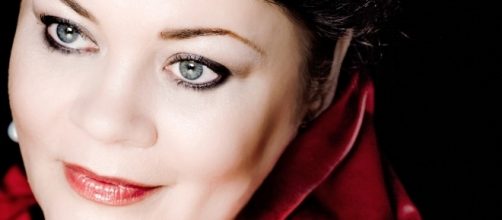Lithuanian opera diva Violeta Urmana, the world over, portrays the most powerful women, especially Giuseppe Verdi’s iconic roles. She has enacted the title role of his ‘Aïda’ 14 times at Metropolitan Opera; in their current run, she will rack up 15 performances there as Aïda’s rival, Amneris, the mighty Pharaoh’s daughter. When she flowed through the Stage Door entrance on a day off for an exclusive interview with Blasting News, the tall woman with shimmering light-blue, almond-shaped eyes and elegant, slender hands, could not have been more gracious, kind and just downright nice.
“The Urmana voice,” often called mezzo-soprano, still sings various soprano roles. The ten years she performed soprano roles exclusively had been the happiest of her career.
Violeta Urmana knew at heart when she began her career as a mezzo-soprano that her voice really wanted to sing soprano roles. So she shifted upwards. She thrived. Verdi’s Odabella (‘Attila’) and Amelia (‘Un ballo in maschera’) and Leonora (‘La forza del destino’) became performance staples, Aïda a favorite. “She’s a strong woman,” she explains, “and much more interesting than Amneris. Her music is gorgeous. She’s incredibly tough, not a weeping weakling. I knew I was a soprano for just a limited time, and it was a wonderful ten years.
But when it’s over, it’s over,” she says with finality. Shifting back brought certain advantages. “Now I have the chance to come back and torture Aïda.” Her ready laughter betrays a lightheartedness unavailable to the tragic heroines she impersonates.
The real Violeta Urmana
She struggled when asked what three words best describe her, finally saying “I’m nice.
I am nice.” And that’s a modest understatement. Having grown up in Lithuania under the Soviet Union’s iron-fisted control, Violeta Urmana treasures words like freedom and peace. What scares her the most? It’s also what most angers her: “The possibility of war.” And she can’t stomach arrogance. Her homeland’s outstanding natural beauty created the recurring desire to visit the sea, any sea.
Total softy
Violeta Urmana’s tenderness seems to spring from a love of dogs. Her earliest memory is of playing with her dog, Pukas (‘Feather’), who had “the most beautiful, fluffy coat.” The last film that made her cry was 2009’s “Hachi: A Dog’s Tale,” with Richard Gere, based on the true story of Hachikō, an Akita Inu who daily awaited his master’s return at the train station, even years after the starring actor’s character had died. If she could find it, she would gladly binge-watch “Dog Whisperer with César Millán.” If she has to choose between puppies and kittens, she prefers both. And “The Sound of Music” is her all-time favorite film. “But just the romantic first half, to that point when the Nazis show up.
When they come looking for the von Trappe family, shining flashlights into the monastery … I stop watching.”
Peaceable peace-maker
Obviously a woman of deep faith, when asked whom she most looks up to in life, Violeta Urmana said, “You can call it ‘Creator,’ maybe, some Higher Force.” If she had superhuman power, she would “destroy every kind of weapon and cleanse violence from the brain of everyone in humanity. It will take a superpower to accomplish that.” The best advice anyone ever gave her? “The whole world belongs to the brave person.” What’s the bravest thing she has ever done? “My whole career I’ve had to be brave.”
Behind the scenes
Despite elevating pleasantness to an art form, Violeta Urmana warns: “After singing Amneris, Eboli and Lady Macbeth so many times, they are part of me now.
So I can’t guarantee I will always be nice if you step on my toes.” For example, in Act Ii of ‘Aïda,’ a suspicious Amneris erupts in wrath after tricking Aïda into revealing she loves Radamès. Ending the interview, she confessed, “Just before Act II Monday night, I told [soprano Krassimira Stoyanova] ‘I’m so sorry I must treat you like this.’” And then, with perfect melodramatic timing she wails: “‘But I was also treated badly!’”
Just two performances of ‘Aïda’ remain at the Met. #Everything Music and Theatre

